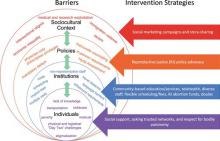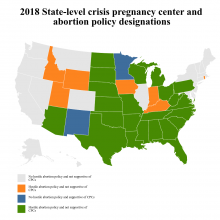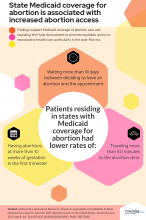Abortion bans challenge midwives’ ability to practice reproductive justice and honor the health care needs and preferences of every individual. Dr. Nancy Niemczyk and her colleagues wrote about the changing landscape for midwives who provide abortion post-Dobbs decision.
abortion
A qualitative, community-led medication abortion study with Black and Latinx People in Georgia
Traditional family planning research has excluded Black and Latinx leaders, and little is known about medication abortion among racial/ethnic minorities, although it is an increasingly vital reproductive health service, particularly after the fall of Roe v. Wade. Findings from Dr.
Early pregnancy confirmation availability at crisis pregnancy centers and abortion facilities in the United States
Findings demonstrate that pregnancy confirmation is more accessible at crisis pregnancy centers (CPC) than at abortion facilities and they are predicted to be exacerbated in the wake of abortion clinic closures following the Dobbs v Jackson Women's Health Organization Supreme Court decision. This highlights the need for improved funding and support for pregnancy confirmation service delivery in medical settings, including abortion facilities.
Pregnancy Tissue Photos Backfire on Abortion Rights Supporters
Faculty member Greer Donley, JD co-wrote a piece for Slate.com about the negative ramifications of the pregnancy tissue photos that have been circling the web. This includes concerns around:
- Suggesting that the acceptability of abortion is based on the appearance of the fetus or embryo undermines and stigmatizes abortion rights after the first trimester
The Cost of Banning Abortion in Pennsylvania
This recent paper shows that banning abortion would severely harm women and birthing people in Pennsylvania, especially those who are BIPOC and have low incomes. The paper shows that the inability to secure an abortion can:
- Harm physical and mental health
- Make it harder to secure an education
- Reduce prospects for employment and good wages
- Likely lead to hardship and poverty
The Medical Community’s Complicity in Marginalizing Abortion Care
Drs. Sonya Borrero, Mehret Birru Talabi, and Christine Dehlendorf discuss the abortion service landscape in their recent JAMA article, confronting how the recent Dobbs decision has caused the medical community to reckon with the systematic exclusion, marginalization, and stigma of abortion care.
Read more:
The Society for Family Planning's #WeCount Report
A national monitoring effort by the Society for Family Planning called #WeCount has documented a major drop in abortions in the U.S., indicating that in the two months after the Supreme Court decision, state bans pushed abortion care out of reach for more than 10,000 people.
State Medicaid coverage for abortion is associated with increased abortion access
Findings from Dr. Borrero's and Dr. Jarlenski's recent study show that patients residing in states with Medicaid coverage for abortion had lower odds and rates of:
- Waiting more than 14 days between deciding to have an abortion and the appointment
- Having abortions more than 10 weeks of gestation when in the first trimester
- Traveling more than 60 min to the abortion clinic
Read more: https://pubmed.ncbi.nlm.nih.gov/36075060/
Care Post Roe
This study is hoping to learn more about how clinical care has changed since Roe v. Wade was overturned.
Share your stories of poor-quality care since the Dobbs decision. The purpose of this study is to collect stories of clinical care that was different from the usual standard due to new laws since June 2022. Examples include:
Pagination
- Previous page
- Page 2
- Next page





